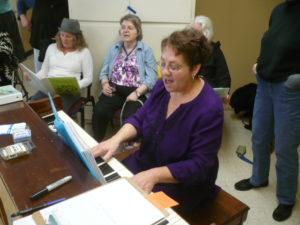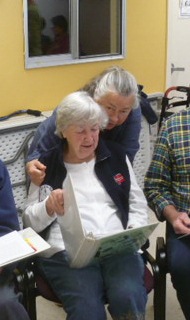The All Present Songbook Volume 2
For reasons I have no desire to remember given what it wrought, my creative energy was surging in the month of June. I proposed to my All Present team that we do a second volume of songs for our song circle. In the past, we’ve just swapped new ones in to replace ones that the group never took to or that we were sick of. The All Present quarter started early in July. We had three weeks. It seemed like a good idea.
We have a dementia-friendly songbook of nearly 100 songs that had been loved almost to death. We have edited them, taken out verses, put in verses, changed the font size, put in repeating choruses and swapped out songs that weren’t working for new ones. I (at the piano), Susan (Abbe) and the Other Susan (who sings, leads, dances and mugs for the group) zing feedback around like ping-pong balls as we sing through the songs at All Present on Thursday mornings. Then Susan (Abbe) goes home and brings her formidable talents as a librarian and editor to bear on organizing and standardizing all our work from the field.
Our first volume contains 40s and 50s standards, Broadway musicals and old popular and folk songs. We have separate sections for Irish songs (so we only have to sing “Danny Boy” for a few months out of the year) and Christmas songs. The folks with memory loss don’t get tired of the songs because they don’t remember they’ve sung them. But after four years we were thoroughly sick of them all. I knew what was coming next before I even turned the page. When the songs go through my head at three in the morning, they go in order.
We drew up our list of over 100 songs. Susan found the lyrics on line and created documents, sections and pages. I went hunting for the accompaniments. This was a seat of the pants operation and I had no budget. Otherwise I could have gotten digital copies of all the songs and had them transposed to singable keys at $5 a pop. Instead I went paging through my entire music library. It took some time but I found all but 17 songs. I found 11 songs on-line at free score sites. Three I wrote out from memory. The public library came through with the last two songs, which were “Mexicali Rose” and “Kisses Sweeter than Wine.”
I screened all the songs for friendly keys. No notes above C-5. Once when people complained that the song was too high, I told everyone to sit up straight and take better breaths. One person thought that was funny.
Classical music is usually available in at least two keys designated high or low; sometimes there’s also a medium. Music scores for popular music are copyrighted in a certain key and it’s almost always either too high or too low for actual human singing. However now it’s possible to buy digital music in different keys. Operative word, buy. I wasn’t buying. Well, okay, I bought two transposed songs (“Swinging on a Star” and “Beyond the Sea”) from a digital site because the thought of transposing them gave me a headache.
Then I transposed 40 of the songs.
Let me tell you what that entails because I am feeling somewhere between aggrieved and martyred. If it’s a simple folk song with two or three chords, I just write out the words and put the chord names above them and play it by ear. But if it’s a Broadway tune or a popular song, it’s often too complicated for me and I need at least the melody line on staff paper.
To transpose, I start with a sheet of music manuscript paper and put treble clefs at the beginning of each line. I space out the words to the songs below the staff lines. I put in the measure lines working either from the music in the impossible-to-sing key or doing it from my own sense of rhythm. Then I find the tessitura of the song, that is to say, the general range of pitches. I look for the highest pitch and notice how often that pitch is actually needed. From those calculations I move the tessitura down. Now I’ve got a key.
At the piano I play the tune in the new key to check that it’s friendly and that it’s actually the key I think it is. Sometimes I can then just write the notes in the new key. But sometimes I have to figure the interval from notes in the impossible-to-sing key to notes in the key I’m transposing to. If it’s five half steps lower, I write notes five half steps lower in pencil. I check all the notes on the piano before I ink in the rhythms. Finally I put the chord symbols in the new key. Voilà. I have a fake sheet. It’s taken about 45 minutes. Times 40.
Okay, so that’s my whine. Susan had hers. She is a professional copy editor. Too many spaces between ellipses make her crazy. In our first volume of All Present songs, every line of every song is punctuated perfectly. Words are spelled correctly and—in case of homonyms– mean what they are meant to mean. Upper and lower case are where they should be. One hundred songs are a lot to punctuate let alone in three weeks.
Susan sent me drafts of lyrics and begged me to make sure that the words she was finding fit the music I was finding. An extra word at the beginning of a line, a gratuitous “and” or “then” can throw off an entire group of singers with or without dementia. I was cursory at best about this. Putting together an accompaniment book for 100 songs, I hadn’t time for such niceties.
I was seven songs into her drafts when I came upon the Welsh folk song “The Ash Grove” and Cole Porter’s “True Love.” I have some particularly wonderful words for “The Ash Grove” from the Arnold Book of Old Songs. I sent them to Susan as my preferred text. I removed the verse from “True Love” saying that no one knew it. Susan wrote back to protest that she knew the verse to “True Love” and that her words to ‘The Ash Grove” were the ones her mother had sung to her.
“Okay,” I wrote. “Put the verse to “True Love” back in but I’m not negotiating on ‘The Ash Grove.’”
I got back the response that had me laughing for days: “Okay, I guess I can live with it. I’ll look at them tomorrow. I can’t stand the sight of them right now.”
I thought she was being funny, playing the martyr, possibly because I felt so much like one. It also could have been the association of “mother.” (Not her mother, mind you, but mine.) Susan says lots of things that make me laugh. This wasn’t supposed to be one of them. This was a cry for help. She was drowning in our little project as much as I was.
We got the book of over 100 new songs thrown together, the Greenwood Senior Center printed it (duplexed and 3-hole punched) and Susan and her husband Mike put the pages into binders. We’ve been struggling through it all summer. Susan can barely look at the book because all she sees is missing punctuation. For myself, there have been a dozen more that needed to be transposed and who knew there were so many different ways of singing “The Big Rock Candy Mountain” and “The Eire Canal” and that people could be so protective about their versions? And that’s just between me and my assistants.
You know who is taking it all in stride with good humor and strong voices? The folks with dementia, the people we did all this for. That calms me down and makes me smile.
“True Love” (with verse and chorus)
Suntanned, windblown,
Honeymooners at last alone,
Feeling far above par,
Oh, how lucky we are.
While I give to you and you give to me,
True love, true love.
So on and on it will always be
True love, true love.
For you and I have a guardian angel
On high, with nothing to do
But to give to you and to give to me
Love forever true.
The Ash Grove (the 7th line is the reason I love these words)
Away in the shadows a lone bird is singing,
The wind whispers low in a sighing refrain;
Their music makes memory’s voices go winging,
The ash grove in beauty I see once again.
The voices of friends that the long years have taken,
Oh, faintly I hear them, the song and the word.
How much in the heart can so little awaken,
The wind in the leaves and the song of a bird.
 RSS Feed
RSS Feed

Okay, this is my chance. The lyrics my mother sang are:
Down yonder green valley where streamlets meander,
When twilight is fading I pensively rove.
Or at the bright noontide in solitide wander
Amid the dark shades of the lonely ash grove.
‘Tis there where the blackbird is cheerfully singing
Each warbler enchants with his notes from the tree.
Ah then, little think I of solitude’s sadness
The ash grove enchanting spells beauty for me.
But Elena’s are pretty good, too.